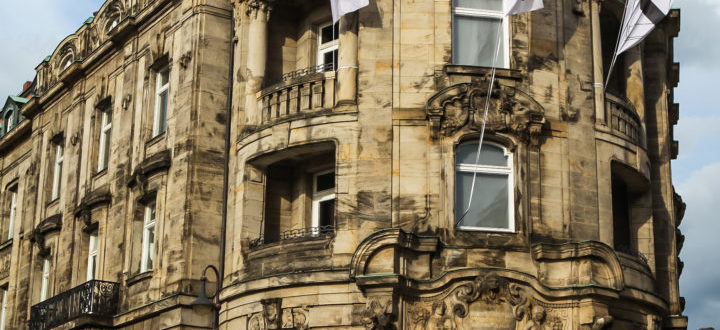The Iwalewahouse is part of the University of Bayreuth and a place of production and presentation of discourse based, contemporary art.
Through exhibits, University research and teaching, collections and archive, Artists/inside residences and events, the latest developments in contemporary art of Africa is presented and in cooperation with artists, curators and institutions actively further developed. The main topic of the research are the areas of modern and contemporary art, the popular culture and media, especially photography and film.
The Iwalewahouse also offers regularly events like thematic lectures, conferences, concerts, movies and readings. The institution leads an artist/ residence program and forms, as a meeting place of international artists and with exhibits a bridge to the Bayreuth public. The Iwalewahouse also has in Germany this one of a kind collection of modern and contemporary art from Africa, Asia and the Pacific area.
In November 2013 a move to a new residence in the Wölfelstraße took place. The Iwalewahouse is now a part of the University Bayreuth and located in the middle of the city. The Iwalewahouse was opened officially already on November 27.1981 to support the main topic of the University Bayreuth, with the goal to bring non-European art and culture to a wider audience.
Founder and director of the Iwalewahouse was Ulli Beier from 1981 to 1985. When he left to go to Papua-Newguiny , Ronald Ruprecht, former director of the Goethe Institute Nigeria, took over the management. From 1989 to 1996 the house was managed again by Ulli Beier. From January 1997 to September 2001, Till Förster became director of the Africa center. With the leaving of Förster to the University in Basel, Tobias Wendl took over the management of the house. After his being called to the University Berlin, the Iwalewahouse is being managed since March 2010 by Ulf Vierke and Nadine Siegert.
Events and Activities with- and in the Iwalewahouse
Cinema Africa! A film festival in cooperation with the Cineplex Cinema. The film festival CINEMA AFRICA was founded by Professor Ute Fendler and presents contemporary African film making every year since 2008. The film week, with the newest film productions, sets the goal to give the Bayreuth public the chance to learn about the diversity of the continent and its history. Many of the films were shown and awarded at international film festivals, some had their premiere in Germany.
The film week deliberately sets no main topic to show a wide selection of themes and stories from different regions of the continent, with different languages and cultures. Thereby, countries, which are never or rarely talked about in the German media, are put into focus. At the same time different genres are represented: drama, action, thriller and comedy. At the end of the film the director and scientists are available for discussion about film work and the selected themes. Parallel to the film festival, the program “Cinema and Beyond” takes place, with talks about film, lectures and workshops with the director, as well as the interweaving with other art forms such as dance, music or photography and literature.
Festival 49 degree: Crossing Boundaries
The interaction of music and art is in Africa and Europe for a while already part of a scene, which takes place between block parties, clubs and art galleries. Due to this, cultural, spatial and temporal boundaries were overcome just as genre boundaries. What existed separated for years, becomes even closer and leads to challenging symbioses. The Crossing Boundaries festival, existing since the middle of the 1990, regularly engages in workshops, music events and concerts for a cultural exchange. In the last year, especially in Germany, relatively unknown cultural phenomenon, such as the heavy metal scene of the African continent, or the African and Diasporean club scenes were introduced.
City tours
Since 2014 scientists of the IAS offer walks which will bring attention to the historic and present global connections of the city of Bayreuth. Grown from an initiative of the BIGSAS, the walk offers diverse change of perspective. On the 90 minutes tour, with access for disabled persons, stories of Alzire at the court of Wilhelmine von Bayreuth, historic tracks of words in public rooms, the development of European racism, which through persons like Chamberlain connected it particularly close with Bayreuth, are discussed. On the way participants encounter Richard Wagner, Houston Stewart Chamberlain, Christoph Schlingensief, Ulli Beier and some more. All this takes place in conversations. The conclusion is the visit of the exhibits in the Iwalewahouse, from whose circle of friends the tours are coordinated.



